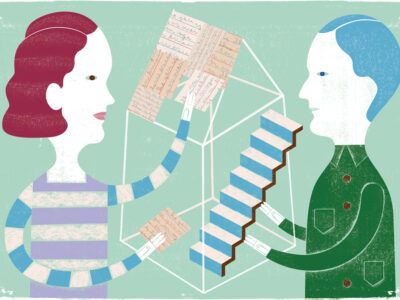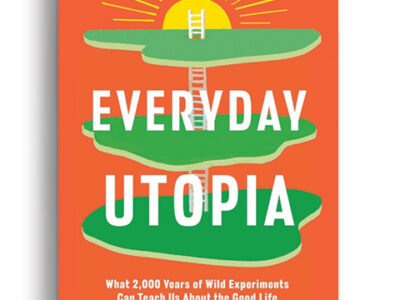
Slavoj Žižek has all the credentials you would expect of a public intellectual: two PhDs, in philosophy and psychoanalysis; authorship of about 50 books and pamphlets, translated into 20 languages; and visiting professorships all over Europe and North America, to go along with his senior research position at the University of Ljubljana’s Institute of Sociology, in his native Slovenia.
But Žižek also draws a crowd, so much so that his October appearance at the Penn Humanities Forum lecture series had to be moved to a larger venue. Introduced by PHF director James English as a “philosopher who could make you laugh out loud,” Žižek lived up to his reputation as an energetic and confrontational social critic who can mingle high theory with pop culture at will. His talk—titled “Are Catastrophes Virtual?”—ranged from the writings of concentration-camp survivor Jorge Semprún to a critique of the motives of those who buy organic apples. In this short passage, the self-described “radical ecologist” offered a prickly take on the way consumerist messages are packaged into organic products.
We live in very interesting ideological times today … You know, when I was young it was still the standard leftist ideology that we in relatively prosperous Western countries live in our ivory tower of false welfare, but outside there are starving others, and so on and so on.
Today, this is the ruling ideology. Bill Gates is saying this all the time: “Who cares about computers when people are still starving of diarrhea in Africa,” and so on. And this has a precise ideological function, I claim. It is an emergency-state logic, to prevent politicization. When you listen to Bill Gates and all those guys, the story always goes on:
“So let us stop with our stupid ideological issues, critique of capitalism, whatever—people are suffering there, forget about politics and ideology! Let’s all get together—private business, state, charity—let’s do something and help them.”
It is precisely a call to do something—and don’t think.
I really think that Starbucks is the example of today’s ideology. You remember that when we were young—at least in my case—we still had this split between private consumerism and doing something for the community. The uniqueness of Starbucks is kind of a pseudo-Hegelian dialectical synthesis. [Audience laughter.] The uniqueness of Starbucks, among others, is that you can do both in one and the same gesture.
Just read what they say in their ads. Their coffee is more expensive because the humanitarian movement is included into it. They say, “We buy our coffee only organically grown. We give part of the profit to help the children to get school, to get water.” It’s as if [they’re] telling you: “You feel guilty about being a consumerist? No problem! Pay a little bit more, and the price for it is included.”
The message is wonderful: Pay half a dollar more for coffee, and we guarantee you that by being a consumerist, you already do your anti-consumerist duty.
—Sean Whiteman LPS’11




